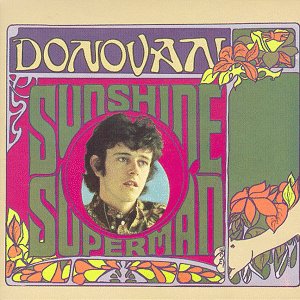Donovan

Sunshine Superman - Pye 1966
Tracks: 1. Sunshine Superman / 2. Legend of a Girl Child Linda / 3. Three King Fishers / 4. Ferris Wheel / 5. Bert's Blues / 6. Season of the Witch / 7. Trip / 8. Guinevere / 9. Fat Angel / 10. Celeste / 11. Breezes of Patchulie [*] / 12. Museum [*] / 13. Superlungs [*] / 14. Land of Doesn't Have to Be [#][*] / 15. Sunshine Superman [Stereo ][*] / 16. Good Trip [*][Demo] / 17. House of Jansch [*][Demo]
Comments:
"Sunshine Superman" was Donovan's first "Electric" album, first released in late 1966. Although producer's Micky Most has been givin much credit for creating Donovan's "new progressive" sound, there had actually been signs on his previous album "Fairytale", that he would be exploring new styles and sounds on forthcoming records. The great song and slightly jazzy "Sunny Goodge Street" would have fitted nicely into the concept of both "Sunshine Superman" and the follow-up album "Mellow Yellow"
When the album was released "Sunshine Superman" had already been a huge hit on the singles charts on both sides of the Atlantic; with its great bass intro hook. On many tracks though, Donovan's folk background still shines through. Some songs are still very folkish, featuring only Donovan and his acoustic guitar, but with additional classical instruments like woodwinds, violins and harpsichord.
Other songs are highly inspired by Indian music featuring both tabla and sitar. Among those the beautiful "Guinevere" and "Fat Angel" are clear favourites. On "Bert's Blues" Donovan combines elements from both jazz and and classical music, creating an almost avantgardish new fusion.
Quite outstanding is the classic "Season of the Witch", which has been covered by various other artists; Donovan at his heaviest! The majestic "Celeste", which closed the original album is another highlight.
The 7 bonus-tracks are all fine. Some are outtakes, others are early versions of songs that would later appear on "Mellow Yellow" and "Barabajal". The booklet is a great read featuring biography and detalied information about each track and Donovan's collaboration with Micky Most.
Though most of the strongest tracks can be found on various compilations; and though a few songs may sound a bit out-dated, the album as a whole still appear as an essential document of how music changed in the middle 1960's, and that Donovan was more than just a softer British echo of what Bob Dylan was doing in America.
 Back to Band pages
Back to Band pages
|